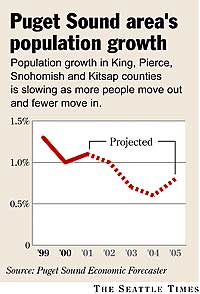|
'So long, Seattle': More people are moving away By
Bradley Meacham and Dave Woodfill Larry Nelsen, president of Hansen Brothers Moving and Storage, said the number of customers his company moved out of Seattle rose by about a third during the past year. "A lot of it was people leaving to get a job," he said. The dot-com crash and Boeing layoffs have left this region with one of the nation's highest jobless rates. Nearly 50,000 Washington residents were receiving unemployment benefits last month, and many are starting to see those benefits run out. Experts are quick to point out that this is no early-1970s exodus, when an aerospace-dependent regional economy was in crisis after deep Boeing cutbacks. Times are tough in many other parts of the country, they say, and Seattle's economy is bolstered by several growing behemoths, from Washington Mutual bank to Microsoft. Still, demographers say the region might experience negative migration — more people moving out than moving in — in 2003 and possibly 2004 as well. "We've really been slammed," said Dick Conway, co-author of the Puget Sound Economic Forecaster. Conway projects that the Puget Sound area's birth rate will outpace the number of people moving out, maintaining a narrow overall population growth. But there's also a chance so many people will move out that the population will decline for the first time since the 1970s. Conway said one reason so many people are leaving is that the dot-com industry employed so many who had only lived in Seattle a year or two. "Since a lot of people working in the dot-coms were relatively young, they were attracted here from out of state, and I'm sure as they lost their jobs, they packed up their bags and took off," he said. But long-time residents are leaving, too. Patricia Maguire, a former quality-assurance worker at Boeing, spent three months sending out résumés after she was laid off, then decided to sell the home in West Seattle where she had lived for 31 years and move to Lake Chelan. "It was the house my children were born and raised in," she said. "It was a bit hard for them. But they were so happy I was making changes." If the trend continues, everyone from apartment landlords to shopkeepers will feel the impact. The number of departures from the central Puget Sound area was up 30 percent during 2002, while there were 30 percent fewer incoming moves, said Shari Blackwood, who heads up corporate-relocation services for Coldwell Banker Bain Associates. The company handles about 1,800 moves a year in the area. Others say there's no noticeable increase in outflow, it's just the number of newcomers that has shrunk. "It used to be about six would arrive for every four that left," said Don Foster, a sales manager at Corporate Moving Systems. "That gap has narrowed." The Greater Seattle Chamber of Commerce saw about half the number of requests for its relocation-information packets in 2002, said spokeswoman Karin Zaugg. The chamber fields requests for information ranging from $3 maps of the area to 30-minute videos that sell for $25. It doesn't track how many of those requests result in moves, she said. There's still interest from particular sectors, such as health care, she said. The Convention and Visitors Bureau said the number of overnight visits to King County, which is often a precursor to moving here, is down. The total dropped by 160,000 to 8.64 million in 2001, partly because of the fear of traveling after the Sept. 11 attacks. Data for 2002 isn't available yet. Rental units, traditionally the first place newcomers live, are another piece of evidence. Apartment Insider, a Seattle corporate-relocation agency that handles half of local moves for Microsoft, is handling about 10 moves each month, said Mardee Austin, managing partner. That's down from 50-60 per month in 2000 and about 20-30 in 2001. "Summer 2000 and early 2001 were incredible," she said. "It started to drop off significantly around 9/11 and just never recovered." The state's in-migration may have hit a five-year low in 2001, with only 21,000 new residents, down from 44,200 in 1999. "(After) all of the big layoffs that we've had, you would really expect more movement out," said Theresa Lowe, a state demographer. "It's not painting a good picture for King (County) right now. "This shouldn't be a surprise to anyone." Bradley Meacham: 206-515-5066 or bmeacham@seattletimes.com.
|
